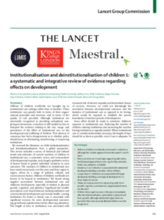Summary
Millions of children worldwide are brought up in institutional care settings rather than in families. These institutions vary greatly both in terms of their organisational principles and structure, and in terms of the quality of care provided. Although institutions are universally recognised as providing suboptimal care giving environments, consensus is still needed on how to interpret the evidence relating to the size, range, and persistence of the effect of institutional care on the development and wellbeing of children. This absence of consensus has led to disagreement as to whether policy should focus on eliminating, transforming, or improving institutions.
We reviewed the literature on child institutionalisation and deinstitutionalisation from a global perspective. This review included a survey of historical and cultural trends and estimates of current numbers of children in institutional care, a systematic review and metaanalysis of developmental sequelae, and a largely qualitative review of factors found to predict individual variations in such outcomes. The numbers of children in institutional care have varied enormously over the years and from region to region, driven by a range of political, cultural, and socioeconomic factors. Millions of children worldwide are known to be housed in institutions. We found strong negative associations between institutional care and children’s development, especially in relation to physical growth, cognition, and attention. Significant but smaller associations were found between institutionalisation and socioemotional development and mental health. Leaving institutions for foster or family care is associated with significant recovery for some developmental outcomes (eg, growth and cognition) but not for others (eg, attention). The length of time in institutions was associated with increased risk of adverse sequelae and diminished chance of recovery. However, we could not disentangle the association between developmental outcomes and the duration of institutional care as opposed to its timing, which would be required to establish the precise boundaries of sensitive periods of development.
Every effort should be made to minimise children’s exposure to institutional care. Reducing the number of children entering institutions and increasing the number leaving institutions is urgently needed. Where institutional care is considered absolutely necessary, the length of stays should be as short as possible, even if care is adequate. To this end, preventive approaches should be promoted, keeping children in birth families when possible. When not possible, care alternatives that are family based should be supported, including extended kinship networks, adoption, and stable, high quality fostering. Policy recommendations to support the implementation of these care reform goals at the global, regional, and local levels are set out in a linked policy Lancet Commission published in The Lancet Child & Adolescent Health.
This paper is the first part in the Lancet Group Commission on the institutionalisation and deinstitutionalisation of children.
Related:
- Institutionalisation and deinstitutionalisation of children: the Executive Summary from a Lancet Group Commission
- Institutionalisation and deinstitutionalisation of children 2: policy and practice recommendations for global, national, and local actors
- Prevalence and number of children living in institutional care: global, regional, and country estimates
- Global prevalence of institutional care for children: a call for change

